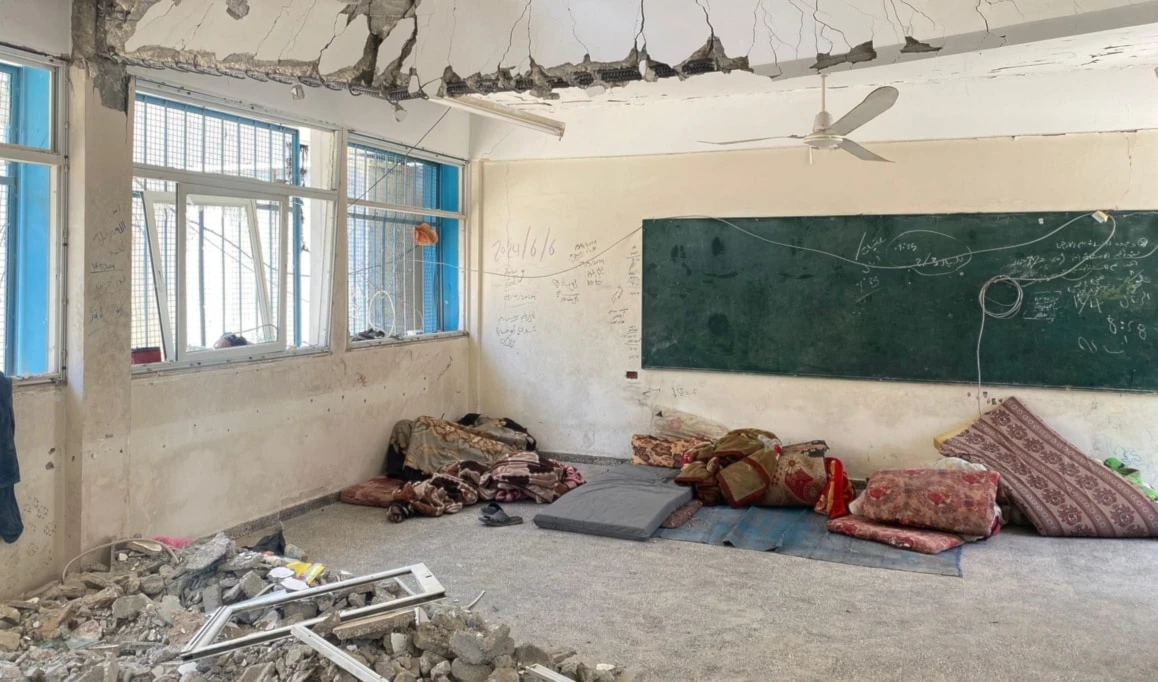Education in Gaza: Teachers and students resist amid Israeli genocide
Education has become a powerful act of resistance amid the devastation of Gaza’s schools and universities.
-

Palestinians inspect the damage at a UN school used as a shelter by displaced residents that was hit by Israeli military strikes, killing more than 15 people, in Jabalia, northern Gaza Strip, on Monday, May 12, 2025. (AP)
In Gaza, where war and forcible displacement have become daily realities, education is no longer just a right, it is an act of resistance. As The Intercept reports, despite the destruction of schools, repeated displacement, and constant fear of bombardment, teachers and students persist in their pursuit of learning, refusing to allow war to erase their futures.
Since the outset of the genocidal war in October 2023, education in Gaza has been systematically dismantled. According to The Intercept, every university in Gaza has been destroyed by Israeli airstrikes, while schools have either been bombed, shuttered, or converted into shelters for displaced families. United Nations data show that over 85% of Gaza’s schools have been either completely or partially demolished.
The magnitude of destruction underscores the devastating toll the war has taken on Gaza’s educational infrastructure, a toll that continues to grow with each passing day.
Teachers amid Gaza war: Teaching through crisis
Assistant English lecturer Serene Nasrallah from the Islamic University of Gaza told The Intercept the war has radically altered her role. “I can’t reach my students easily,” she explained, referencing the near-total blackouts and internet failures. “I just share slides. I can’t explain. I can’t engage. I use my phone to manage everything, even grading.”
She described the emotional toll as well as logistical hardship. “They are surrounded by anxiety, fear, and anticipation; their academic level is badly affected.”
The death of a student who had requested an exam delay due to injuries still haunts her. “How can you ask someone to focus on grammar while they’re burned and broken?” Despite everything, Serene continued, “I do it hoping this experience might one day help me get a scholarship or job overseas. But mostly, I do it for the reward from Allah.”
Her message is clear: “The most urgent need is not resources, it’s security. Only when the bombs stop falling and the genocide ends can the learning truly begin.”
Gaza student resilience in the face of loss
For medical student Heba Alajouz, the Gaza war's impact on students is deeply personal. A third-year student at Al-Azhar University, Heba has seen her campus destroyed and her professors disappear, some killed, others now working in overwhelmed hospitals.
The destruction of schools and the loss of over 800 education workers further hinder any chance of rebuilding their academic lives.
— Al Mayadeen English (@MayadeenEnglish) January 27, 2025
As these children grapple with unimaginable loss, including over 38,000 newly orphaned, the path to a brighter future seems increasingly out of… pic.twitter.com/VV41BwCuI4
“We stopped attending university. Professors are unreachable,” she told The Intercept. Electricity and connectivity remain unreliable. “I miss everything about university life: my friends, the atmosphere, the daily routine.”
Her academic life has been on pause for eight months. “Every day brings a moment of hopelessness.” Still, Heba clings to faith, “I hope this war ends soon so we can study like students everywhere, safely and with dignity.”
Not an isolated case
Architecture student Fatima Skaik once dreamed of designing Gaza’s future. Now displaced and grieving the loss of her home and university, she told The Intercept, “My only dream is to survive, finish my studies, and help rebuild Gaza.”
Fatima’s education was halted from October 2023 to August 2024. Poor internet access remains a major obstacle. But the support of her professors keeps her going. “They would reach out when I disappeared due to internet outages. That kept me going.”
To her, learning amid displacement is an act of resistance. “We resist not only with weapons but with knowledge, persistence, and resilience. Education itself is a form of defiance.”
Education as defiance in Gaza
Senior English student Nadera Moshtaha echoes the trauma. “Our university has been destroyed, our friends have been killed, and we no longer attend classes on campus,” she told The Intercept.
Multiple displacements and personal losses weigh heavily. “There is no safe place in the entire city,” she explains. Power cuts prevent her from studying at night, her only quiet time.
“I long for my friends, our laughs, and those vibrant mornings. The war has dried my tears. I don’t cry anymore, not even at goodbyes.”
When asked about her future, she replies, “Honestly, I don’t know. If there were no war, I could have answered where I see myself.”
Still, she holds onto purpose, “Hope still flies, even among death. I try to keep writing and learning because maybe I can help this city, even with my words.”

 4 Min Read
4 Min Read










